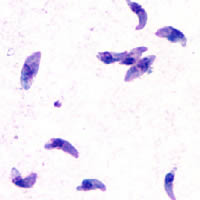
Photo from wikipedia
Leishmania spp. (Kinetoplastida) are unicellular parasites causing leishmaniases, neglected tropical diseases of medical and veterinary importance. In the vertebrate host, Leishmania parasites multiply intracellularly in professional phagocytes, such as monocytes… Click to show full abstract
Leishmania spp. (Kinetoplastida) are unicellular parasites causing leishmaniases, neglected tropical diseases of medical and veterinary importance. In the vertebrate host, Leishmania parasites multiply intracellularly in professional phagocytes, such as monocytes and macrophages. However, their close relative with intracellular development—Trypanosoma cruzi—can unlock even non-professional phagocytes. Since Leishmania and T. cruzi have similar organelle equipment, is it possible that Leishmania can invade and even proliferate in cells other than the professional phagocytes? Additionally, could these cells play a role in the long-term persistence of Leishmania in the host, even in cured individuals? In this review, we provide (i) an overview of non-canonical Leishmania host cells and (ii) an insight into the strategies that Leishmania may use to enter them. Many studies point to fibroblasts as already established host cells that are important in latent leishmaniasis and disease epidemiology, as they support Leishmania transformation into amastigotes and even their multiplication. To invade them, Leishmania causes damage to their plasma membrane and exploits the subsequent repair mechanism via lysosome-triggered endocytosis. Unrevealing the interactions between Leishmania and its non-canonical host cells may shed light on the persistence of these parasites in vertebrate hosts, a way to control latent leishmaniasis.
Journal Title: Pathogens
Year Published: 2023
Link to full text (if available)
Share on Social Media: Sign Up to like & get
recommendations!